Interview: Poet Jared Harel on ‘The Body Double’
|
|||||||||||||||||
|
The scholar John Rodden calls the literary interview a “fully-fledged genre.” I used to be skeptical, but after assigning my students at The College of Saint Rose to speak with an author, I’m more inclined to think the literary interview qualifies as a distinct form of performance. I put out a call on Facebook and Twitter: Would you speak to a college student about your book? I asked. Sure, they said. Review copies were sent, students selected authors, read and researched their work, and asked questions. - Daniel Nester, Contributing Word Editor |
POET JARED HAREL ON ‘THE BODY DOUBLE’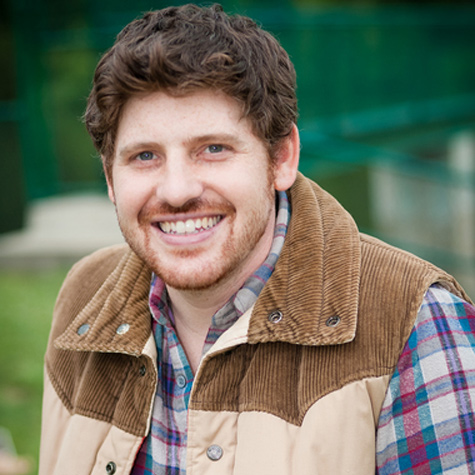 |
||||
INTERVIEWED BY
|
Poet-drummer Jared Harel and his wife Yael welcomed a baby girl into their lives on November 16, 2012. The happy couple had decided to name her Neta: Hebrew for both “a seedling” and “to plant.” Besides being a first-time dad, Harel is a drummer in the New York City band, The Dust Engineers. He’s also a passionate lover of Bob Dylan music for the same reason some dislike the singer: Dylan’s voice is imperfect. “I often feel that when a voice is imperfect, it makes the lyrics feel more earnest and believable,” he says. Jared’s view of Dylan’s voice relates to my view of reality: if something is imperfect, it is in fact more “earnest and believable.” After all, there is no such thing as perfect. Jared is a longtime, hardworking poet. As he put it: “One should expect writing to be difficult. If we writers only wrote when we were properly inspired, we’d only write a handful of times per year.” From his home in Queens, NY, Jared discussed, over email, his writing career, music, and more specifically, his recently published chapbook, The Body Double. This is a complex series of poems combining point of view, irony, and play with words. BURCH: Is The Body Double an autobiographical poem? HAREL:Is the poem based on my life? Yes. Is it an autobiographical poem? Absolutely not. More specifically, the poem investigates issues of identity and autobiography, as well as Rimbaud’s famous dictum that “I is another”: we are always, somehow, at a distance from ourselves. Though certain sections have autobiographical elements, the poem as a whole veers off, exaggerates, and splits off from the truth, etc. This is where the notion of the body double comes in. BURCH: While reading The Body Double, the line, “I showed you my penis. I pointed out trees,” made me think of Freud, because his psychoanalytic theory placed a great deal of emphasis on sexual impulses, and because his therapy technique of dream analysis tendedto interpret objects such as trees as having sexual implications. HAREL: Interesting read. I was considering the obvious connections between “tree” and “penis,” but also their differences. I liked the juxtaposition of the speaker showing something so personal, then suddenly pointing off towards something vague in the distance. To me, that seemed like a nice metaphor for this project. BURCH: I tried to do a research paper last semester on the play Waiting for Godot and existentialism, but all the scholarly journals I could find about existentialism went way over my head. HAREL: An existential crisis is when someone goes into a panic, questioning the very foundation of his or her life. In this moment of exasperation for the speaker, with his double in bed beside him, an existential crisis would be welcoming by comparison. BURCH: What happens to the father in the poem? In the first stanza, it sounds like he is alive, but missing in action. In the second it sounds like he died: “swallowed by the hood of a Buick.” Or might I be misinterpreting things? I admit I’m not very analytical. HAREL: The father character is not dead in this poem, though he is “absent.” The father character is a mechanic by trade, and so being “swallowed by the hood of a Buick” is one way of saying that the father is consumed by his work to the point of invisibility. It’s as though he’s been swallowed by the car itself. At least that’s my read on it. BURCH: Why the line: “I’ll keep them out of this. Consider it a kindness”? Does it refer to the parents? After all, they had already been mentioned in the first stanza, so this line is a contradiction. HAREL: Exactly right. The speaker, you’ll notice, constantly contradicts himself. He is an unreliable narrator. Furthermore, I view this first section you’re referring to as the initial split between the speaker and his double. “I’ll keep them out of this” is made untrue by the very presence of that line, and many others. BURCH: Who is your favorite poet? HAREL: I have many favorites: Elizabeth Bishop, C.K. Williams, Wallace Stevens, Thomas Lux, Terrance Hayes, Mark Doty, and Alice Fulton. Lately, I’ve been very taken by the poetry of Robert Lowell. One of the first poets to truly capture my interest and imagination was Stephen Dunn. In writing The Body Double, I was strongly influenced by Zbigniew Herbert’s poetry collection, Mr. Cogito. BURCH: When did you first start writing? HAREL: I began writing poems seriously my senior year of high school. My English teacher at the time, Mrs. Schmidt, asked us to write five poems for our poetry section. I think I wrote twenty, and kept on going. I had very little quality control back then. I think what first drew me to poetry was its ability to track time—to record and document the world around me. These days, I demand far more of the poems I write, yet I’m grateful I wasn’t so hard on myself back then. Poetry came naturally to me. I write short stories as well, but I hardly ever have enough to say to constitute as a full story. For a while in college, my poems read like really, really short stories. BURCH: You write, at some point: “There is no room for surrealism.” Wouldn’t you think this line is ironic, seeing as the whole idea of the poem is, in fact, pretty surreal? HAREL: Yes, it is ironic. It’s worth noting that while many of the themes in this book (loss, death, and identity) are serious ones, at least to me, one of the overarching themes of the book is “play.” I had a lot of fun writing this. I have long found the concept of doubling fascinating, and I enjoyed watching the two of them interact and get on one another’s nerves over the course of the narrative. BURCH: Where did you get the inspiration for The Body Double? HAREL: I began writing this series as a reaction to all the “autobiographical poems” I was writing. I was shocked to find that even in such deeply personal works, I was a very unreliable narrator, if not an outright liar. I found myself struggling with the notion of what is true in my poems. What obligations I had to actual fact. This got me thinking, and so I decided to create an exact replica of myself, a body double. I have long found the concept of doubling fascinating, and both intellectually and psychologically, it has been a great deal of fun watching the two of us interact. BURCH: You play drums for The Dust Engineers, a rock band in NYC. Is rock your favorite kind of music? HAREL: I certainly love rock music, but not strictly. Even my band The Dust Engineers pulls from various influences such as country, blues, folk, and twang. I should mention that I’m a huge Bob Dylan fan, a preference that factors specifically into one of the body double sections. BURCH: How long have you been teaching at Centenary College?Do you enjoy teaching writing? HAREL: This is currently my fourth year teaching Creative Writing at Centenary College. I love working with students and talking poetry. My favorite part of teaching is getting a student of mine to fall in love with the written word, helping them develop into strong, daring writers, and helping them to understand that poems aren’t simply the cryptic puzzles they labored over in high school, but a way to reinvigorate language. —- Excerpt from The Body Double I forgot who your place amiss. Forgive me, You must be I reached for you The sky, I uttered, you are petting I showed you § Since true emotions are inarticulate by factoring out. My girlfriend She wonders what he’s thinking, after screwing, she screams she means it. He sees she means it § My body double tells me Meanwhile, he’s agreed He insists it’s no trouble around my refinished deck. unless it is Sunday, |
||||
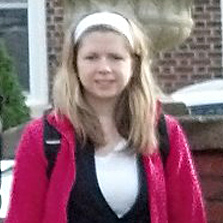 |
|||||
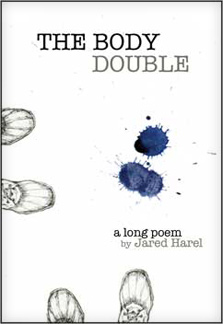 |
|||||
|
Visit Jared Harel… www.jaredharel.com |
|||||










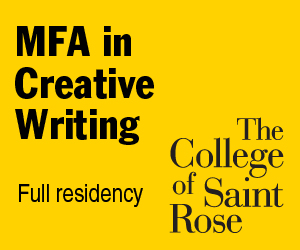
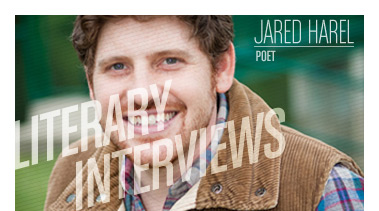
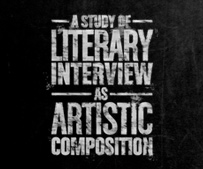














 Stated
Stated
Reader Comments